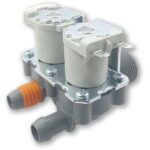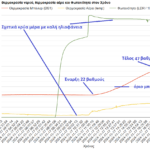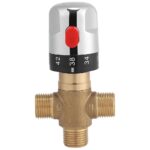Closed-Circuit Solar Water Heaters
Closed-circuit solar water heaters represent the most advanced option for heating water using solar energy. This system is ideal for areas with cold climates, as it offers protection against frost and ensures high efficiency even under difficult conditions.
How They Work
In a closed circuit, a separate fluid (usually a mixture of water and antifreeze) circulates through the solar collectors. This fluid is heated by solar radiation and transfers the heat through a heat exchanger to the water in the storage tank (boiler). The domestic water does not come into contact with the circulating fluid, which protects the system from freezing and other adverse conditions.
Advantages
- Frost Protection The antifreeze fluid protects the system from low temperatures, making it suitable for cold areas.
- High Efficiency Closed-circuit solar water heaters perform exceptionally well even in low-temperature or low-sunlight conditions.
- Long-Term Durability The absence of direct contact between domestic water and the collectors reduces corrosion and scale build-up, extending the system’s lifespan.
- Clean Domestic Water The separation of the domestic water from the circulation loop ensures the water remains clean and safe.
Disadvantages
- Higher Installation Cost The need for a heat exchanger and antifreeze fluids increases the purchase and installation cost of the system.
- More Complex Maintenance Maintenance is more demanding, as it includes regular checks and possible replacement of the circulating fluid.
- Greater System Complexity More components and greater complexity increase the likelihood of failures compared to open-circuit systems.
Maintenance
Maintenance includes:
- Checking and renewing the antifreeze fluid every 2–3 years.
- Cleaning the collectors from dust, dirt, or leaves.
- Inspecting the heat exchanger and pipes for leaks or damage.
Ideal Use Areas
Closed-circuit solar water heaters are ideal for:
- Areas with a cold climate, where temperatures often drop below zero.
- Regions with unstable sunlight conditions, as the system works efficiently even with low solar radiation. In Greece, this type of solar water heater is considered standard, but one may also encounter open-circuit systems, which are more common in Cyprus and Israel.
Cost
The initial cost of a closed-circuit system is higher than that of an open-circuit one, but its greater durability and excellent performance make it a cost-effective long-term investment.
Conclusion
Closed-circuit solar water heaters offer top performance, safety, and durability, making them ideal for colder regions or Mediterranean countries that experience all four seasons. Although more expensive, their long-term energy savings and reduced wear on domestic water make them a worthwhile investment.
- Improvements in the Placement of the Data Logger - 29 January 2025
- Solar Water Heater Statistics – December 2024 - 10 January 2025
- Washing machines with dual water supply - 24 December 2024











